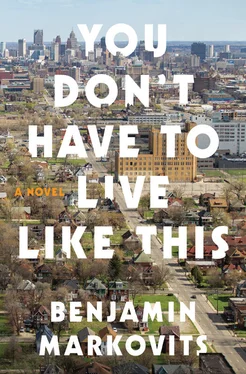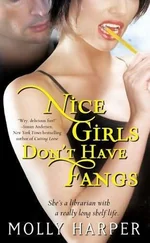Gloria wore a green wool dress, with long sleeves, and dark tights — it was like she had only two things on. She had pulled something up and pulled something down. Her lips were painted the same bright wet color she wore the day I met her, at Bill Russo’s place in the country, and she had on a bright cheerful mood, too.
As we walked down to the car, she said, “What do you get to eat for three hundred dollars?”
“I think it’s a Thanksgiving theme.”
“That’s all right,” she said. “I’m one of those people that loves turkey. Leftovers, too. Turkey and gravy and mash potatoes, all of that.”
It was just after noon on the first Saturday in December. There was overnight snow on the ground and tiny, almost invisible specks of snow or rain falling through the air like salt. But the roads felt powdery under my tires and not icy or slick. We made good time.
A black SUV blocked the entrance to the parking lot and then pulled out of the way after I waved the clearance badge, which came with my invitation.
The old Wayne Conner plant used to be run by General Motors, to make diesel engines, but they shut down their diesel division in 1979. For the next twenty years it got leased to different companies, mostly light-truck manufacturers. Then it went empty. Robert James bought the plant in 2008 and rented it to a California web company, which hired the Kraemer Group, a Detroit architecture firm, to turn the factory space into office space.
It was a nice building. There were three lines of tall continuous windows running the length of each floor, and around the corners, too, and the brickwork was faded to a chalky shade of fall yellow. The main entrance wasn’t much to look at, just a couple of flat high gates, with a smaller door cut into one of them, which is the one we used. Two Secret Service guys in black suits and overcoats stood by the gates, doing the eye-roll patrol, and another woman in a temporary booth sat with a space heater blowing at her feet and checked our names against the guest list.
But inside was warm. We walked through a metal-detector arch and somebody took our coats and gave us a ticket. Behind the coat-check table you could see, through internal windows, row after row of graphite-gray cabinets sprouting red and blue wires. The hum was about as loud as the noise of the sea when you’re sitting on the beach. But the party was upstairs, in the open-plan office area, and much louder.
Somebody had rigged a projector to one of the computers, to show a football game against part of the white wall. Because that’s what you do on Thanksgiving, I guess, watch football. . Michigan was playing Ohio State and the band was still on the field when we arrived, a few minutes before kickoff. Then the players ran out of the tunnel, looking about ten feet tall and stippled like golf balls against the office paneling. Even over the noise of the party you could hear the trumpets of the marching band. I got a little buzz off it and took a beer from one of the drinks tables, and gave one to Gloria.
“See anybody you know?” she said, and I said, “I want you to meet an old friend of mine,” because Beatrice was talking to Cris by the floor-length window.
“Listen,” Gloria said. “If someone tries to introduce us to the president, I’m just saying if it happens, don’t expect me to say a word. You’ll have to do the talking. I don’t think I could.”
“I haven’t seen him yet.”
Cris and Beatrice seemed to be in midflow, but we wandered over anyway. Beatrice was listening and Cris was saying, “You know what I keep thinking about, I keep thinking about the fact that there are all these stories men have, you know, when they’re confessing things to you, which is what they do to show they can talk to women, and it kind of works when you’re just starting to go out and sitting in some nice restaurant, and it’s exactly these stories which you can’t bear to hear once you’re married to them. Hello, Marny,” she said. “I’m being disloyal for once in my life. It’s wine at lunch. Don’t grass on me. Introduce me.”
“This is Gloria, she teaches at the high school where I sometimes substitute. Cris used to be a lawyer.”
“That’s a terrible introduction,” Cris said.
Outside the snow started coming down heavier, the salt had turned into corn puffs, and the second-floor factory window showed all of it, about a hundred feet wide. Beyond the parking lot I could see a raised highway, and beyond that and underneath it some temporary storage facilities and container units half buried in snow. There wasn’t much traffic on the highway but what there was kept coming just as steady as the snow. At one point I noticed a stream of black SUVs approaching and figured the president had arrived.
Tony stood watching the game, and I excused myself and went over to him.
“Who’s that black girl you came in with?”
“Someone I teach with. Cris is on a roll.”
“We had a fight,” he said.
Clay Greene was there, too, with a glass of champagne in his hand. “You’re a young man,” he said, “and I’m going to give you a little advice, which you’re not going to take. But it’s good advice. Apologize. Tell her what she thinks you did wrong, and apologize for that. Do it now and you can still enjoy yourselves this afternoon.” He seemed already a little drunk.
“Where did you get that?” I said, pointing at the champagne flute.
He looked at me vaguely. “Robert gave it to me.”
So I left my beer somewhere and went over to find Robert. I looked for Gloria, but by this point she was talking to Beatrice alone, and somehow I liked seeing the two of them together. Anyway, I wanted to bring her back a glass of champagne.
The room was large and full of people, the ceilings were low and we had to crowd ourselves around the office furniture. I pushed past men in suits and women in cocktail dresses, and guys in jeans and girls wearing heels and jeans or heels and miniskirts. There was a smattering of black faces. Robert had invited local businessmen, community-representative types, but he’d also given free passes to some of the new immigrants. There was a lottery system. People from the five neighborhoods could sign up, and later they found out if their name was on a list.
Robert wanted to play on the story of the Pilgrims’ feast; the Thanksgiving theme was his idea. Like it was native Detroiters who gave of their bounty to provide this meal, who welcomed us in. But the fact is most guests had to pay through the nose, and the money went to the Michigan Democratic Party.
Waitresses in white aprons and waiters in stiff white shirts served up little paper plates of food on silver trays. I ate a mini turkey burger with stuffing on top and ended up carrying around, then crumpling into my pocket, a salty paper cone that held sweet potato fries. In a side room, I saw Robert sitting on a rigged-up stage, with bright lights shining in his face that made him look powdered or rouged. He was talking to a guy with a mic.
“One thing we discussed,” Robert said, “one thing that worried me, is how big to make these neighborhoods.” His voice was gently amplified. There were people standing around, drinking and eating and watching. Robert sat in an office swivel chair; he looked very comfortable. “And in the end what I decided was, they should roughly add up to a midsize college campus. There’s a reason people have such nostalgic feelings in this country about their four years of college. And it isn’t just the football team. It’s because college is really the only time in our lives that most of us get to live in the kind of small-town community that we still associate with the founding of this country. And by the way, the Pilgrims on the whole were young, they were a young group of people, some of them were starting out in life for the first time, marrying and setting up a household and raising kids, and some of them had been out in Holland and were having a second or a third chance at it, starting over from scratch. And when you look around you, not just here and today, but in those neighborhoods, and you can imagine that I sometimes like to take a quiet walk around them, what you see is more or less. .”
Читать дальше












